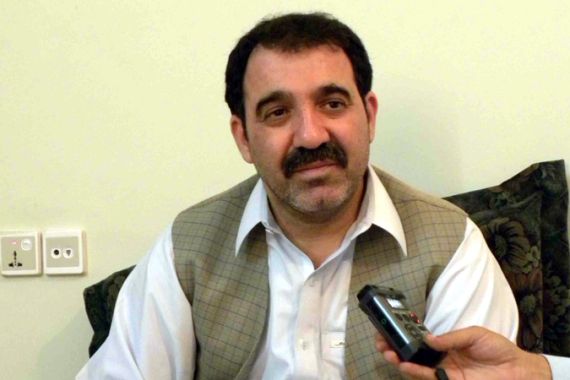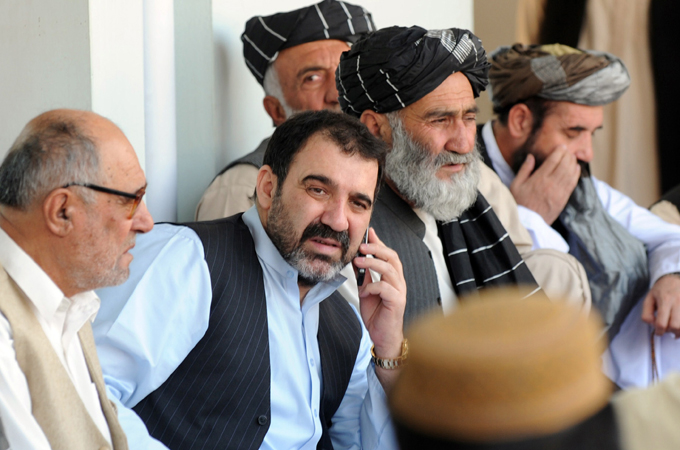Obituary: Ahmed Wali Karzai
Brother of Hamid Karzai, who was one of the most powerful people in the country, was hounded by controversy.

 |
| Karzai, second from left, was effectively the governor of Kandahar and very influential in Afghanistan’s south [AFP] |
Ahmed Wali Karzai, the younger half-brother of Hamid Karzai, the Afghan president, was the chief of the Kandahar Provincial Council and one of the most powerful men in Afghanistan’s south, even if he was continually dogged by controversy.
Karzai was born in 1961 in Karz, Kandahar, and is an elder of the Popalzai tribe. He was first elected to the provincial council in 2005, and since then has been at the centre of a number of controversies, most notably allegations that he was on the Central Intelligence Agency’s payroll.
Karzai was “absolutely crucial [in the Afghan political landscape], and arguably you could say that after the president … this was possibly the second most powerful Afghan currently in Afghanistan,” says Al Jazeera’s James Bays, who met with him several times and has extensively covered the conflict in Afghanistan.
Ahmed Wali Karzai’s supporters say he had a talent for bringing the different tribes together and solving their disputes. He was effectively the governor of Kandahar province. Karzai also exerted considerable influence in neighbouring provinces.
Critics, however, have alleged that Karzai was a corrupt provincial official who was heavily involved in the heroin and opium trade; claims that both he and his brother have consistently denied.
It was known, for example, that in 2001 he had stayed rent-free in a house owned by Haji Azizullah, a known Afghan international drug trafficker. But Karzai maintained that he had no idea that Azizullah had any connection to drugs.
The allegations, however, have stuck. In 2007, he was accused in the Afghan parliament of being involved in the international drug trafficking.
Shortly afterwards, the United States recommended to Hamid Karzai, the president, that Ahmed Wali be posted abroad as an ambassador, in order to limit potential embarrassment.
“I am not a drug dealer, I never was and I never will be. I am a victim of vicious politics,” Karzai said in 2008.
Continued controversy
There was controversy, too, over his role in the 2009 elections, when his brother Hamid was re-elected as the country’s president. Opponents alleged that Ahmed Wali rigged polls in his brother’s favour in districts where he was doing poorly.
He also claimed that he had brokered a peace deal with the Taliban ahead of the August 2009 polls – a claim that did not stop the Taliban from carrying out a series of at least 73 attacks on election day.
In 2009, the New York Times published perhaps the most explosive report on Karzai: that he had been on the CIA payroll since 2001, putting together a militia of Afghan paramilitary forces to conduct raids against suspected Taliban fighters in Kandahar.
Karzai consistently denied the claim, saying: “I don’t know anyone under the name of the CIA. I have never received any money from any organisation. I help, definitely. I help other Americans wherever I can. This is my duty as an Afghan.”
While the US had made repeated attempts to freeze Karzai out, by 2010 it appeared that efforts to find hard evidence against him had failed, and the Americans “decided to work with him, rather than against him”, Al Jazeera’s Bays says.
Despite all the murky allegations around him, Karzai was never one to shy away from the press.
“He was very keen, despite all of the bad press he received, to speak to the press – always happy to talk to us, and always happy to take a phone call. And when you spoke to him in person, he was always very courteous,” says Bays.
Ahmed Wali had survived several previous assassination attempts. In May 2009, his motorcade was ambushed by men armed with machine guns and rockets in Nangarhar province. One of his bodyguards was killed in that encounter, but he escaped unharmed.
That attack came about two months after the Taliban attacked the Kandahar Provincial Council’s offices with four suicide bombers, killing 13 people. Karzai said that assault had been aimed at him.
In March 2010, a senior US military official told the Reuters news agency that Karzai could be targeted for killing or capture if it were ever proved that he provided arms or assistance to insurgent groups.
“We’d rather not have a guy like that down there because he’s so divisive,” the official said. “But there’s nothing that we can do unless we can link him to the insurgency.”
Karzai was killed on July 12, 2011, when his close confidant opened fire on him in his own home. He was shot in the stomach and chest as he emerged from a bathroom.